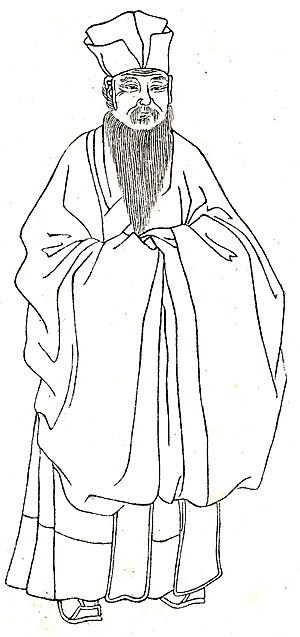Cheng Yi (philosopher) facts for kids
Quick facts for kids
Cheng Yi
|
|
|---|---|

Imaginary of Cheng Yi by Shangguan Zhou (上官周, b. 1665).
|
|
| Born | 1033 |
| Died | 1107 (aged 74) |
| Era | Neo-Confucianism |
| Region | Chinese Philosophy |
|
Influences
|
|
|
Influenced
|
|
| Personal Name | |||||||||
|---|---|---|---|---|---|---|---|---|---|
| Traditional Chinese | 程頤 | ||||||||
| Simplified Chinese | 程颐 | ||||||||
|
|||||||||
| Courtesy Name | |||||||||
| Chinese | 程正叔 | ||||||||
|
|||||||||
| Literary Pseudonym | |||||||||
| Chinese | 伊川先生 | ||||||||
|
|||||||||
Cheng Yi (1033–1107) was an important Chinese thinker during the Song Dynasty. He was known for his work as a classicist, writer, philosopher, and politician. Cheng Yi worked closely with his older brother, Cheng Hao.
Both brothers were students of Zhou Dunyi. They were also friends with Shao Yong and nephews of Zhang Zai. These five thinkers, along with Sima Guang, were called the Six Great Masters by Zhu Xi, who followed their ideas. Cheng Yi became a leading figure in Neo-Confucianism. The ideas of Cheng Yi, Cheng Hao, and Zhu Xi are often called the Cheng–Zhu school or the Rationalistic School.
Contents
Cheng Yi's Life and Work
Early Life and Education
Cheng Yi was born in Luoyang, Henan province, in 1033. He started studying at the national university in 1056. By 1059, he earned the "presented scholar" degree. This was a high academic achievement.
Political Career and Challenges
Cheng Yi lived and taught in Luoyang for most of his life. He often turned down offers for high government jobs. He strongly disagreed with the reform policies of Wang Anshi. When Wang Anshi's group was removed from power, Cheng Yi was appointed as an expositor-in-waiting in 1086. His job was to teach the emperor about Confucianism.
Cheng Yi was known for being very determined and sometimes stubborn. This led him to make some enemies. One notable enemy was Su Shi, a leader of a different political group. In 1097, his enemies managed to get his teachings banned. His property was taken away, and he was sent into exile.
Later Years and Legacy
Three years later, Cheng Yi received a pardon. However, his work was banned again in 1103. He was finally pardoned for good in 1106, just one year before he passed away.
In 1452, a special title, Wujing Boshi, was given to Cheng Yi's descendants. This title was also given to the families of other famous Confucian thinkers like Mencius, Zengzi, Zhou Dunyi, and Zhu Xi. This shows how important Cheng Yi was in Chinese history.
A Story of Dedication
There is a famous Chinese saying, a chengyu, called 程門立雪 (Chéng Mén Lì Xuě). It means "standing in the snow at Cheng's door." This saying comes from a story about two men, Yang Shi and You Zuo. They wanted to become Cheng Yi's students. They waited for hours in the snow outside his door. This story became a famous example of how devoted people should be to learning. It also showed the importance of respecting one's teacher in Confucianism.
See also
In Spanish: Cheng Yi (filósofo) para niños
 | DeHart Hubbard |
 | Wilma Rudolph |
 | Jesse Owens |
 | Jackie Joyner-Kersee |
 | Major Taylor |

